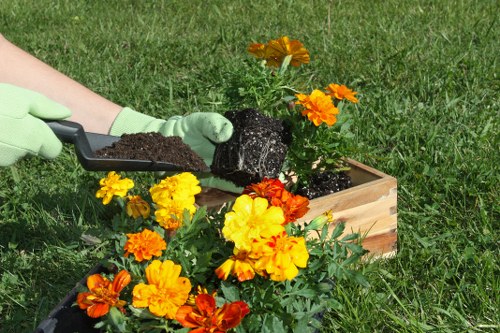Comprehensive Garden Maintenance Services in Wallington
Introduction to Garden Maintenance

Maintaining a beautiful garden requires dedication, knowledge, and the right tools. **Garden Maintenance in Wallington** offers a range of services tailored to keep your outdoor space thriving year-round. Whether you’re a gardening enthusiast or prefer to leave the hard work to professionals, understanding the essentials of garden care can help you achieve a picturesque and healthy garden.
Wallington’s climate presents unique challenges and opportunities for gardeners. From the mild winters to the warm summers, each season demands specific maintenance tasks to ensure your garden remains vibrant and resilient. By partnering with local experts, you can navigate these seasonal changes effectively and keep your garden in top shape.
In this comprehensive guide, we will explore various aspects of garden maintenance, offering tips and best practices to enhance the beauty and functionality of your garden. From soil preparation to plant selection, irrigation systems to pest control, we’ve got you covered.
Seasonal Garden Maintenance

Understanding seasonal garden maintenance is crucial for the longevity and health of your plants. Each season brings its own set of tasks that help your garden thrive.
Spring Maintenance
Spring is a pivotal time for garden maintenance. **Pruning** dead branches, planting new flowers, and preparing the soil for upcoming growth are essential tasks. Additionally, spring is the perfect time to install or check your irrigation systems to ensure they’re functioning correctly.
Summer Maintenance
During the summer months, focus on regular watering, weeding, and pest control. Proper **mulching** helps retain moisture and suppress weeds, while consistent monitoring for pests can prevent infestations from spreading.
Autumn Maintenance
Autumn involves preparing your garden for the colder months. **Leaf removal**, planting bulbs for next spring, and protecting delicate plants from frost are key activities. It’s also a good time to fertilize your soil to replenish nutrients lost during the growing season.
Essential Garden Tools and Equipment

Having the right tools is fundamental to effective garden maintenance. Investing in quality equipment can make tasks easier and more efficient.
- Pruning Shears: Essential for trimming and shaping plants.
- Garden Fork: Useful for aerating soil and removing weeds.
- Watering System: Ensures consistent hydration for your plants.
- Mulching Tools: Helps in applying and spreading mulch evenly.
- Pesticides and Herbicides: Necessary for controlling pests and weeds.
Regular maintenance of these tools, such as sharpening blades and cleaning equipment after use, will extend their lifespan and ensure they perform optimally.
Soil Preparation and Fertilization

Healthy soil is the foundation of a thriving garden. Proper soil preparation and fertilization provide the necessary nutrients for plants to grow strong and resilient.
Soil Testing
Conducting a soil test helps determine its pH level and nutrient content. This information is vital for selecting the right plants and determining the type of fertilizers needed. **Amending** your soil with organic matter like compost can improve its structure and fertility.
Fertilization Practices
Choosing the right fertilizer depends on your garden’s specific needs. Organic fertilizers, such as compost and manure, are environmentally friendly options that enrich the soil naturally. Chemical fertilizers can provide faster results but should be used sparingly to avoid harming beneficial soil organisms.
- Nitrogen-rich fertilizers promote leafy growth.
- Phosphorus-rich fertilizers enhance root development and flowering.
- Potassium-rich fertilizers improve overall plant health and disease resistance.
Applying fertilizer at the appropriate times, typically during the growing season, ensures that plants receive a steady supply of nutrients.
Plant Selection and Care

Choosing the right plants for your garden is a critical step in garden maintenance. Selecting plants that are well-suited to Wallington’s climate and soil conditions can significantly reduce maintenance efforts.
Native Plants
Native plants are adapted to the local environment, making them more resilient and easier to maintain. They require less water, are more resistant to pests, and support local wildlife, enhancing the biodiversity of your garden.
Perennials vs. Annuals
Understanding the difference between perennials and annuals can help you plan your garden layout effectively. **Perennials** come back year after year, providing long-term structure, while **annuals** offer vibrant, seasonal color but need to be replanted annually.
- Advantages of Perennials: Low maintenance, long-lasting, and often more resistant to pests.
- Advantages of Annuals: Wider variety of colors and blooms, allowing for creative and dynamic garden designs.
Mixing both types in your garden can create a balanced and visually appealing landscape.
Irrigation and Water Management

Efficient water management is essential for maintaining a healthy garden, especially during the hot summer months.
Types of Irrigation Systems
There are several irrigation systems to choose from, each with its own benefits:
- Drip Irrigation: Delivers water directly to the plant roots, minimizing waste.
- Sprinkler Systems: Ideal for larger areas but can be less efficient due to evaporation.
- Soaker Hoses: Easy to install and provide consistent moisture.
Choosing the right system depends on your garden size, plant types, and water availability. Regularly checking and maintaining your irrigation system ensures it operates efficiently and conserves water.
Pest and Weed Control

Managing pests and weeds is a significant aspect of garden maintenance. Effective control methods protect your plants and maintain the garden’s aesthetic appeal.
Integrated Pest Management (IPM)
IPM is a sustainable approach that combines biological, cultural, and chemical methods to control pests. This strategy minimizes the use of harmful pesticides and promotes natural predators, maintaining a balanced ecosystem in your garden.
Weed Control Techniques
Weeds compete with your plants for nutrients and water, making their management essential. Effective weed control methods include:
- Mulching: Suppresses weed growth by blocking sunlight.
- Hand Weeding: Manual removal of weeds is effective for small gardens.
- Herbicides: Should be used as a last resort, targeting specific weed types without harming desired plants.
Implementing these techniques helps maintain a healthy and pristine garden environment.
Lawn Care and Maintenance

A well-maintained lawn enhances the overall appearance of your garden. Proper lawn care involves regular mowing, fertilizing, aerating, and addressing pest issues.
Grass Selection
Choosing the right type of grass suited to Wallington’s climate ensures a lush and resilient lawn. Common options include:
- Fescue: Tolerates shade and drought conditions.
- Bermuda Grass: Thrives in full sun and is highly durable.
- Kentucky Bluegrass: Known for its rich color and fine texture.
Each grass type has specific care requirements, so understanding these needs helps in maintaining a healthy lawn.
Regular Lawn Maintenance
Maintaining your lawn involves several key practices:
- Mowing: Keep grass at an optimal height to promote growth and prevent weeds.
- Fertilizing: Apply suitable fertilizers during the growing season to nourish the grass.
- Aerating: Helps improve soil structure and allows better air and water penetration.
- Pest Control: Monitor for lawn pests and address infestations promptly to prevent damage.
Consistent lawn care ensures a vibrant and inviting outdoor space.
Hardscape Maintenance

Hardscapes, such as patios, walkways, and fences, complement your garden’s natural elements and require regular maintenance to stay in good condition.
Patio and Walkway Care
Keeping patios and walkways clean and free of debris enhances their appearance and safety. Regular sweeping, power washing, and repairing cracks or uneven surfaces prevent deterioration and accidents.
Fence Maintenance
Fences define your garden’s boundaries and provide privacy. Regular inspections for damage, repainting or staining, and repairing broken panels ensure they remain functional and attractive.
Garden Structures
Other garden structures like pergolas, sheds, and gazebos also require upkeep. Cleaning, treating for pests, and performing necessary repairs extend their lifespan and maintain their aesthetic appeal.
Landscape Lighting

Proper lighting can transform your garden, making it accessible and enjoyable even after dark. **Landscape Lighting** highlights architectural features, creates ambiance, and enhances safety.
Types of Landscape Lighting
Various lighting options can be incorporated into your garden design:
- Path Lights: Illuminate walkways and steps, enhancing safety and visibility.
- Spotlights: Highlight specific plants or garden features.
- String Lights: Provide decorative lighting for seating areas and pergolas.
- Solar Lights: Eco-friendly options that harness solar energy for illumination.
Choosing the right combination of lights adds depth and dimension to your garden, creating a magical nighttime environment.
Installation and Maintenance
Professional installation ensures that your lighting system is safe and effective. Regular maintenance, such as replacing bulbs and cleaning fixtures, keeps the lights functioning properly and looking their best.
Professional Garden Maintenance Services in Wallington

While DIY garden maintenance is achievable, **professional services** offer expertise and efficiency that can elevate your garden’s appearance and health.
Benefits of Hiring Professionals
Professional garden maintenance services provide several advantages:
- Expert Knowledge: Professionals understand local climate conditions, soil types, and plant care techniques.
- Time-Saving: Outsourcing maintenance tasks frees up your time for other activities.
- Quality Results: Skilled gardeners ensure meticulous care and attention to detail.
Customizable Maintenance Plans
Garden maintenance companies in Wallington offer customizable plans tailored to your garden’s specific needs. Whether you require regular upkeep, seasonal services, or comprehensive landscape management, professionals can create a plan that fits your requirements and budget.
Eco-Friendly Practices
Many professional services adopt eco-friendly practices, such as using organic fertilizers, implementing water-saving irrigation systems, and promoting biodiversity. These sustainable approaches benefit your garden and the environment.
DIY Garden Maintenance Tips

For those who prefer a hands-on approach, here are some DIY maintenance tips to keep your garden in excellent condition:
Regular Weeding
Consistently removing weeds prevents them from competing with your plants for nutrients and water. Hand weeding or using a hoe can effectively control weed growth.
Pruning and Trimming
Regular pruning encourages healthy plant growth and maintains the desired shape and size of your plants. Remove dead or diseased branches to promote air circulation and prevent pest infestations.
Composting
Creating a compost pile recycles garden waste and kitchen scraps into nutrient-rich compost. This organic matter enriches the soil, enhancing its fertility and structure.
- Benefits of Composting:
- Reduces landfill waste.
- Improves soil health.
- Promotes sustainable gardening practices.
Implementing these DIY practices ensures a healthy and vibrant garden while also fostering a sense of accomplishment and connection with nature.
Common Challenges in Garden Maintenance

Gardening comes with its set of challenges. Identifying and addressing these issues promptly can save you time and effort in the long run.
Pest Infestations
Pests can cause significant damage to your plants, leading to reduced growth and even plant death. Common garden pests include aphids, caterpillars, and beetles. Implementing IPM strategies and using natural predators can help manage pest populations effectively.
Disease Management
Plant diseases, often caused by fungi, bacteria, or viruses, can spread quickly and affect multiple plants. Early identification and treatment are crucial. Removing infected plants and applying appropriate fungicides can prevent the spread of diseases.
Weather Extremes
Extreme weather conditions, such as droughts or heavy rains, can stress plants and disrupt garden maintenance routines. Installing proper irrigation systems, using mulch to retain soil moisture, and selecting resilient plant varieties can mitigate the impact of adverse weather.
Enhancing Garden Aesthetics

Aesthetics play a significant role in garden maintenance. A visually appealing garden creates a relaxing and inviting outdoor space.
Plant Arrangement
Thoughtful plant arrangement enhances the visual appeal of your garden. Consider factors like color coordination, height variations, and blooming seasons to create a harmonious and dynamic landscape.
Decorative Elements
Incorporating decorative elements such as garden statues, water features, and unique planters adds character and style to your garden. These features personalize your space and create focal points.
Pathways and Borders
Well-defined pathways and borders guide movement through the garden and delineate different areas. Using materials like gravel, stone, or wood adds texture and interest to the garden design.
Sustainable Gardening Practices

Sustainability in gardening focuses on practices that are environmentally friendly and resource-efficient. Adopting these methods benefits both your garden and the broader ecosystem.
Water Conservation
Implementing water-saving techniques, such as rainwater harvesting and using drought-resistant plants, reduces water consumption and ensures your garden remains lush even during dry periods.
Organic Gardening
Using organic fertilizers and natural pest control methods promotes a healthy garden without the use of harmful chemicals. Organic gardening supports beneficial insects and fosters a balanced ecosystem.
Recycling and Upcycling
Repurposing materials for garden use, such as using old containers for planters or creating compost from kitchen scraps, minimizes waste and encourages creative gardening solutions.
- Benefits of Sustainable Gardening:
- Reduces environmental impact.
- Promotes biodiversity.
- Enhances soil health.
Conclusion and Next Steps

**Garden Maintenance in Wallington** is essential for creating and sustaining a beautiful and healthy outdoor space. Whether you choose to maintain your garden yourself or hire professional services, understanding the key aspects of garden care will help you achieve your landscaping goals.
By implementing the tips and best practices outlined in this guide, you can overcome common challenges and enhance the aesthetics and functionality of your garden. From seasonal maintenance to sustainable practices, each step contributes to a thriving garden that you can enjoy year-round.
Ready to Transform Your Garden?
Contact us today to learn more about our comprehensive garden maintenance services in Wallington. Let our team of experts help you create the garden of your dreams.
Book your service now and take the first step towards a more beautiful and manageable garden.